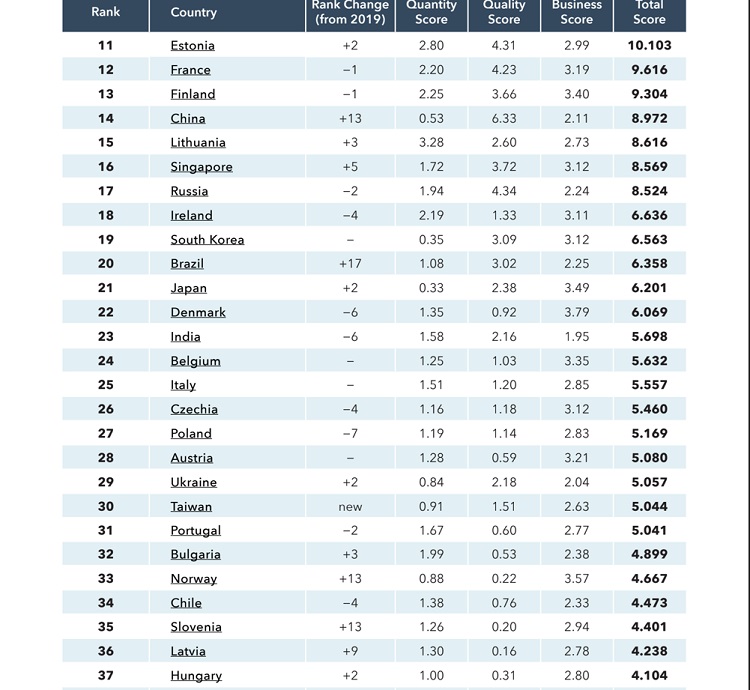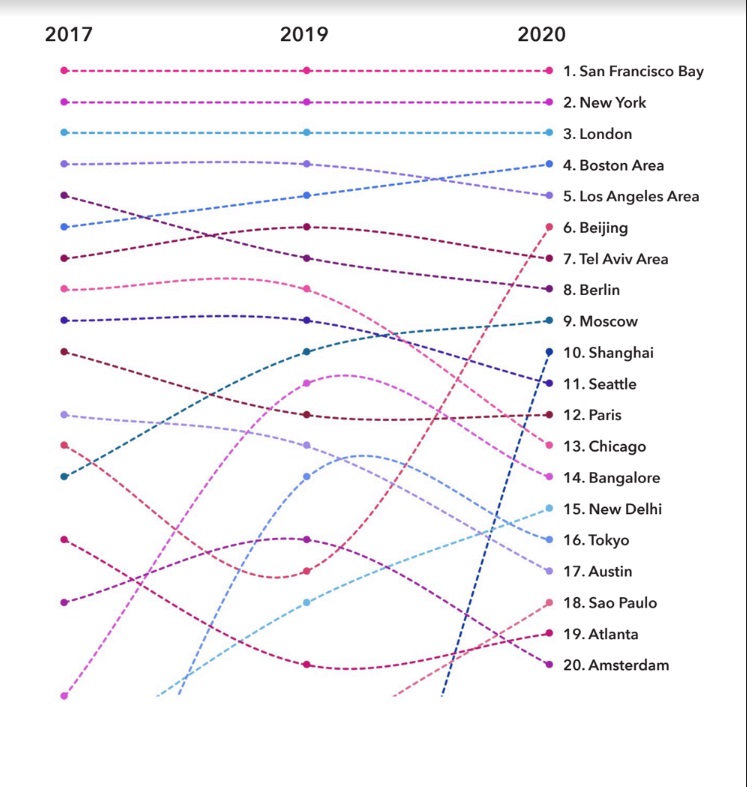Baltic, Business, EU – Baltic States, Fintech, Good for Business, Innovations, Rating, Technology
International Internet Magazine. Baltic States news & analytics
Sunday, 14.12.2025, 03:53
Lithuania and Estonia climbing up the global entrepreneurship ladder
 Print version
Print versionThis is StartupBlink’s 3rd global startup ecosystem report, as part of quest to uncover the trends of innovation throughout 1,000 cities and 100 countries. “We have decided to launch the report in the midst of the pandemic, since innovation should now be more important than ever, as it leads us toward solutions to this crisis. Our algorithm results took hundreds of hours of calibration and conversation. The amount of thought and effort invested into the 2020 edition of the rankings makes us confident of their quality and uniqueness”, Eli David CEO, StartupBlink told.
Country Rankings Insights

The Big 4 club of countries has held its ground since 2017, showing
that there is a real
gap between these 4 countries and those below that will be hard to
narrow. However,
this year, there has been an internal shift in the Big 4.
While the US that has maintained a substantial ranking gap from all
other countries,
the big four also includes the UK, Israel, and Canada. The only change
that differs from
2019 in the Big 4 is between Israel (3rd) and Canada (4th).
Outside of the Big 4 the gap between countries is much smaller, and we
see Germany
taking advantage of this to jump up 4 places and take 5th. The
Netherlands (6th) and
Switzerland (8th) have stayed stable, while Australia has had a
disappointing year,
falling by two spots to 7th. Spain has had a positive year moving up 1
spot to 9th, while
Sweden has dropped a discouraging 3 places to 10th.
Outside of the top 10, there are several interesting results in 2020.
Estonia (11th) has
moved up by two places in a very competitive area of the rankings,
although maybe the
most substantial change registered is China moving up 13 places to
14th. It should be
recognized that the large gains made by China and its cities in 2020
are partly due to
algorithm changes, as well as China’s inevitable growth of its IT sector.
Trends in Top 20 Countries

Cities Rankings Insights
In Europe, there has been a positive trend in the Baltics, with Tallinn
(66th) and Vilnius
(75th) rising by 17 and 10 places respectively. There has been a
disappointment for
Zurich in 2020, which decreased by 12 places to 65, while Basel has
made substantial
gains to rank at 72 .
The European region has a total of 339 startups ecosystems (from 45
countries)
represented in our Top 1000 ranking. Consisting mainly of high income
nations, the region
has 6 countries featured in the Global Top 10.
There haven’t been any massive variations among the region’s top
performers, although
there are two increases and one decrease worth mentioning: Germany (up
4 spots to 5th)
is now ranked 2nd in Europe, Lithuania (up 3 places to 15th) and Sweden
(down 3 places
to 10). As for cities, the EU has only only one city in the top 10 ranked ecosystems.
Estonia has created a high-tech global brand
Lithuania: A global fintech hub is emerging
Lithuania enjoys great momentum and is now ranked 15th globally. For
a country of a population less than 3 million, Lithuania boasts a relatively
strong quantity score. It is ranked high in the Baltic region as well, standing
at 2nd and closely following Estonia. The Baltic region is now an established
startup region with 2 highly capable startup ecosystems in the top 20 rankings.
At the country level, Vilnius, the capital of Lithuania, has increased 10 places to be ranked 75 in the world. The second ranked city of Kaunas continues showing strong momentum and is ranked at 112, improving 2 places. In the Baltic region, Vilnius is ranked 2nd after Tallinn, Kaunas is 3rd, outrunning Riga, the capital city of Latvia.
Original full report read here
- 28.01.2022 BONO aims at a billion!
- 26.08.2021 LLC Dizozols Investments finalizes investment attraction deal with Crowdestor with record-high profits
- 13.02.2021 Моя жизнь в газете. Очерки по новейшей истории Латвии. Глава 1
- 30.12.2020 Накануне 25-летия Балтийский курс/The Baltic Course уходит с рынка деловых СМИ
- 30.12.2020 On the verge of its 25th anniversary, The Baltic Course leaves business media market
- 30.12.2020 Business Education Plus предлагает анонсы бизнес-обучений в январе-феврале 2021 года
- 30.12.2020 Hotels showing strong interest in providing self-isolation service
- 30.12.2020 EU to buy additional 100 mln doses of coronavirus vaccine
- 30.12.2020 ЕС закупит 100 млн. дополнительных доз вакцины Biontech и Pfizer
- 29.12.2020 Latvia to impose curfew, state of emergency to be extended until February 7








 «The Baltic Course» Is Sold and Stays in Business!
«The Baltic Course» Is Sold and Stays in Business!

